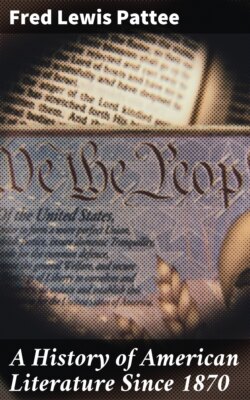Читать книгу A History of American Literature Since 1870 - Fred Lewis Pattee - Страница 35
На сайте Литреса книга снята с продажи.
IV
ОглавлениеTable of Contents
A novelist must rise or fall with his characters. What of Harte? First of all we must observe that he makes no attempts at character development. Each personage introduced is the same at the close of the story as at the opening. He has no fully studied character: we have a burning moment, a flashlight glimpse—intense, paradoxical, startling, then no more. We never see the person again. The name may appear in later sketches, but it never designates the same man. Colonel Starbottle is consistent from story to story only in make-up, in stage "business," and the well known "gags"—as, for instance, a succession of phrases qualified by the adjective "blank." "Yuba Bill" is Harte's synonym for stage driver, "Jack Hamlin" for gambler. We have a feeling constantly that the characters are brought in simply to excite wonder. Gabriel Conroy devotes his life for years to the finding of his sister Grace. He leaves his wife to search for her; he can think of nothing else; yet when at length he does find her among the witnesses in a courtroom he takes it as a mere commonplace. A moment later, however, when told that his wife, for whom we know he cares nothing at all, has given birth to a son, he falls headlong in a swoon.
His characters may perhaps be true to facts; he may be able to give the prototype in every case; and yet we are not convinced. The stories told by the college freshman at home during his first Christmas vacation may all be true, and yet they may give a very false idea of college life in its entirety. So it is with Harte. The very year that he landed in California a procession of one thousand children, each child with a flower in his hand, marched one day in San Francisco. The Luck of Roaring Camp gives no such impression. In all save the remotest camps there were churches and worshipers, yet who would suspect it from Harte's tales? California has never accepted Harte's picture of its life, just as the South has never accepted Uncle Tom's Cabin. It is not fair to picture an era simply by dwelling on its exceptions and its grotesque possibilities. Art must rest upon the whole truth, not upon half truths.
The truth is that the man had no deep and abiding philosophy of life; he had indeed no philosophy at all. In the words of his discerning biographer, Merwin,
There was a want of background, both intellectual and moral, in his nature. He was an observer, not a thinker, and his genius was shown only as he lived in the life of others. Even his poetry is dramatic, not lyric. It was very seldom that Bret Harte, in his tales or elsewhere, advanced any abstract sentiment or idea; he was concerned only with the concrete; and it is noticeable that when he does venture to lay down a general principle, it fails to bear the impress of real conviction. The note of sincerity is wanting.[46]
The fact that his rascals in a crisis often do deeds of sublime heroism must not deceive us, despite the author's protestations of a great moral purpose underlying his work.
Without claiming to be a religious man or a moralist, but simply as an artist, he shall reverently and humbly conform to the rules laid down by a Great Poet who created the parables of the Prodigal Son and the Good Samaritan, whose works have lasted eighteen hundred years, and will remain when the present writer and his generation are forgotten. And he is conscious of uttering no original doctrine in this, but of only voicing the beliefs of a few of his literary brethren happily living, and one gloriously dead, who never made proclamation of this from the housetops.[47]
This is insincere to the point of bathos. We feel like saying, "Bah!" Harte makes his villains heroes at the crisis simply to add finesse to his tale. He is dealing with paradoxes; he is working for his reader's wonder. If in a moment where pity is expected, woman is harsh and man tender; if the reputed good man is a rascal at the supreme test, and the reputed rascal proves suddenly to be a saint, it adds to the effectiveness of the tale.
Everywhere there is the atmosphere of the theater. The painted backgrounds are marvels of skill. There are vast color effects, and picturesque tableaux. There is a theatric quality about the heroines; we can see the make-up upon their faces. Too often they talk the stagiest of stage talk as in the first parting scene between Grace Conroy and Arthur Poinset. The end is always a drop-curtain effect. Even Tennessee's Partner must have its appropriate curtain. We can imagine a double curtain for The Outcasts of Poker Flat: the first tableau showing the two dead women in the snow, the second the inscription over the body of Oakhurst, the gambler. Instead of closing the book with a long breath as after looking at a quivering section of human life, we say, "How strange! What brilliant work!" and we feel like clapping our hands for a tableau of all the cast, the spot light, and the quick curtain.
Bret Harte had no real affection for the West; he never again visited it; he never even wrote to the friends he had left there. With Mark Twain it was greatly different. The West to him was home; he loved it; he recorded its deepest life with sympathy. To Harte it was simply a source of literary material. He skimmed its surface and found only the melodramatic and the sensational.
